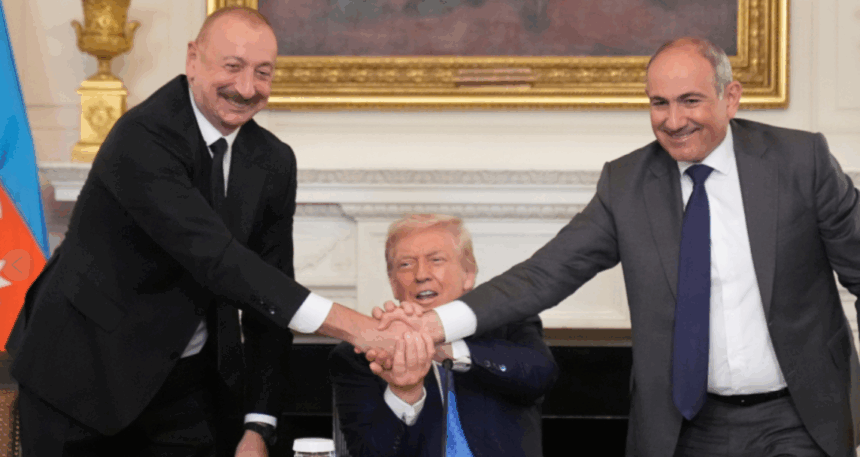In geopolitics, timing is never an accident. When Russian drones hit a SOCAR oil depot in Odesa on the night of August 8, the world saw another attack in Moscow’s relentless campaign against Ukraine’s energy infrastructure. Four Azerbaijani employees were injured, a diesel pipeline was damaged, and a blaze raged for hours before firefighters brought it under control. Two days prior to this attack, another incident occurred in Orlivka near Odesa—a gas compressor station that had been supplying even small volumes of Azerbaijani natural gas to Ukraine came under fire by Russian forces. This compressor station, part of the Trans-Balkan route carrying Azerbaijani gas into Ukraine, was deliberately targeted.
Azerbaijan and Ukraine on Sunday condemned these airstrikes targeting Azerbaijani energy infrastructure in Ukraine, including facilities owned by the state oil and gas company SOCAR, vowing the attacks would not derail bilateral energy cooperation. The condemnation came during an Aug. 10 phone call between Azerbaijani President Ilham Aliyev and Ukrainian President Volodymyr Zelenskyy. “Both sides condemned the deliberate airstrikes by Russia on an oil storage facility owned by Azerbaijan’s state oil and gas company SOCAR in Ukraine,” the Azerbaijani presidency said. The statement also cited attacks on “other Azerbaijani facilities and a gas compressor station transporting Azerbaijani gas to Ukraine.”
More Than Just an Attack on Ukraine
The headlines around the globe framed it as part of Russia’s broader effort to cripple Ukraine’s economy. But the strike’s timing told another story — one that had less to do with Ukraine and more to do with Azerbaijan. The Odesa attacks — like the earlier strike on the Orlivka gas compressor station— came as Azerbaijan was engaged in sensitive final-stage negotiations over the peace agreement. Less than 24 hours after those drones hit the SOCAR oil depot, Azerbaijani President Ilham Aliyev and Armenian Prime Minister Nikol Pashinyan stood in Washington to sign a U.S.-brokered peace agreement that will reshape the South Caucasus. At the heart of that accord is the Zangezur corridor — a transport link cutting through Armenia’s Syunik province to connect mainland Azerbaijan with its Nakhchivan exclave and Turkey beyond. The deal grants the United States a 99-year lease to secure and manage the corridor, transforming it from a concept born in Russian-brokered ceasefires into a pillar of Western influence in Eurasia.
From Moscow’s perspective, this corridor is not just infrastructure. It is a direct challenge to Russian strategic control in the Caucasus. For decades, the Kremlin has viewed the region as part of its post-Soviet sphere of influence, maintaining leverage over both Yerevan and Baku by controlling borders, trade routes, and energy corridors. Now, that grip is slipping — and the Zangezur corridor is the clearest symbol of the shift. Once envisioned under Russian supervision, it will now bypass both Russia and Iran, tying Azerbaijan’s connectivity to Turkey and embedding U.S. security oversight for nearly a century.
The United States and European Union have already been reinforcing Azerbaijan’s westward pivot. EU-backed pipeline investments and the recent start of Azerbaijani gas shipments to Ukraine via the Trans-Balkan route are tying Baku’s fortunes to European energy diversification goals. The Washington peace signing further locks Azerbaijan into a regional framework in which Russia is no longer the primary broker.
Seen in that light, both the Odesa and Orlivka strikes look less like a random blow against Ukraine’s energy grid and more like a preemptive warning to Azerbaijan. By targeting a high-profile Azerbaijani asset far from the Caucasus, Russia demonstrated both reach and willingness to impose costs on Baku for geopolitical choices it doesn’t approve of. The message: if Azerbaijan deepens its alignment with the West, Moscow can make life painful well beyond the Zangezur corridor.
The Death of Neutrality:
The strikes also landed amid a deep and escalating deterioration in Russia–Azerbaijan relations. The December 2024 downing of an Azerbaijan Airlines passenger jet by Russian air defenses, killing 38 people, shattered trust. The June 2025 Yekaterinburg raids, in which two Azerbaijani brothers died in custody under what Baku says was torture, pushed relations into open hostility. Azerbaijan retaliated with arrests of Russian nationals, a freeze in diplomatic contacts, and increasingly confrontational rhetoric from its leadership.
For two years, Azerbaijan had maintained a careful neutrality in the Ukraine war, supplying humanitarian and infrastructure aid to Kyiv but no weapons. That restraint is now in doubt. Officials in Baku have warned that continued Russian strikes on Azerbaijani assets could prompt the lifting of its self-imposed arms embargo, potentially opening the way for deliveries of drones, precision munitions, and other advanced systems — many developed in partnership with Turkey and proven in the 2020 Karabakh war.
For Russia, such a move would be a strategic blow, adding a capable and politically willing arms supplier to Ukraine’s roster of backers. For Azerbaijan, it would mark the definitive end of its decades-long balancing act between East and West, signaling not only a deepened alignment with Western capitals but also potentially paving the way for closer integration with Euro-Atlantic security structures — even opening the door, in time, to a NATO membership bid.
In addition to the possibility of lifting arms embargoes, Azerbaijan has continued its actions in response to the escalating situation. On August 11, President Ilham Aliyev signed a decree that allocates $2 million from the 2025 presidential reserve fund for humanitarian aid to Ukraine. According to the Azerbaijani presidency, the funds will be transferred to the Ministry of Energy to purchase Azerbaijan-produced electrical equipment and ship it to Ukraine.
The sum is modest compared to Azerbaijan’s total humanitarian assistance — over $44 million to date, making it the largest contributor among CIS countries — but the timing and conditions make it highly symbolic. The decision came just hours after the Washington summit between Aliyev and Armenian Prime Minister Nikol Pashinyan, and in the immediate aftermath of Russian strikes on SOCAR facilities in Odesa and other Azerbaijani-linked energy infrastructure in Ukraine.
By stipulating that the funds be spent on Azerbaijani-made power equipment, Baku signaled its determination to sustain energy cooperation with Ukraine despite Russian attacks. The message was clear: whether or not Moscow strikes Azerbaijani assets, the flow of energy support to Kyiv will continue. In this sense, the $2 million is less about its monetary value and more about the political statement it delivers.
Moscow’s Warnings Turn to Open Threats
Against this backdrop, Russian military analyst Yuri Podolyaka says the August strikes mark a deliberate shift in Kremlin policy: the end of its informal prohibition on hitting SOCAR assets in Ukraine. For most of the war, he notes, those facilities — even when openly supplying fuel to Ukrainian forces — were deliberately spared. “That time is over,” he declares, framing the change as a calculated decision rather than an incidental strike.
Podolyaka links the shift to what he calls Azerbaijan’s “growing hostility” toward Russia, highlighting Baku’s efforts to deliver natural gas to Ukraine via compressor stations in the Odesa region. One such hub — Orlivka — has already been destroyed. He presents the strike not as an isolated incident but as part of a broader campaign to impose costs on Baku for aligning with Western interests. In his assessment, the prospect of a Russia–Azerbaijan military confrontation has moved from a theoretical scenario into a plausible contingency for which Moscow must prepare.
He also dismisses Aliyev’s threats to lift Azerbaijan’s self-imposed arms embargo on Ukraine as ineffective, stressing that Baku has already been supplying ammunition since 2023. From his perspective, these deliveries actually work to Russia’s advantage by depleting Azerbaijan’s stockpiles, making it militarily weaker should conflict erupt in the Caucasus.
In his Telegram commentary, Podolyaka went further, making clear that the campaign is not limited to the battlefield:
“We must continue to weaken Azerbaijan’s ability to help our enemies, and most importantly — to fight its agents inside Russia. And this fight has already begun.”
Adding to the tension, war correspondent Yuri Kotenok asserts that Baku’s decision to supply weapons to Ukraine has already been made. In contrast to Podolyaka, who frames the issue as a looming possibility, Kotenok treats it as a political decision awaiting implementation: “This is not rumor — it’s a decision. The shipments will come. Only the scale and the timing are undecided.” If correct, it would mean Moscow is no longer trying to deter a potential threat, but responding to an active strategic realignment — one that could soon channel Turkish-built drones, precision munitions, and other advanced weaponry into Ukraine from a state it once regarded as a balancing partner in the South Caucasus.
Another front in the war of words opened in Moscow’s State Duma. Andrey Gurulyov — a retired general, former commander of Russia’s elite 58th Army, and now a member of the ruling United Russia party — warned that Russia could retaliate against Baku’s growing alignment with Kyiv by targeting both trade and the Azerbaijani diaspora in Russia.
Speaking in a video message, Gurulyov called it “not at all wise” for Azerbaijan to sour relations with “a major neighbor like Russia.” If Baku continued on its current path, he said, Moscow had “tools” it could deploy — from restricting imports of Azerbaijani agricultural products, such as tomatoes, peppers, and eggplants, to putting pressure on Azerbaijani business networks operating in Russia.
The threat was explicit: “If Azerbaijani goods disappear from Russian store shelves, nothing will change for us — but a lot will change for them.” Gurulyov also suggested that security services could “work with” the Azerbaijani diaspora in Russia, which numbers between two and two and a half million, with many employed in the agricultural sector. The implication was clear: Moscow could disrupt the livelihoods of a significant share of that community, with economic and political shockwaves in a country of just 10 million people.
This sharp rhetoric comes alongside an unprecedented diplomatic snub: for the first time in years, Azerbaijan skipped a CIS Interior Ministers’ meeting hosted by Russia in St. Petersburg on August 12. Interior ministers from Armenia, Belarus, and all Central Asian states attended, but Azerbaijan’s Vilayat Eyvazov was absent — a marked departure from tradition. CIS gatherings have long been used by Aliyev and Putin to strengthen bilateral ties through formal and informal meetings. That Baku would boycott such an event now underscores just how far relations have deteriorated.
Moldova’s Energy Lifeline Under Fire
The Orlivka strike also carried an equally sharp message for Chișinău. For Moldova, Orlivka is the keystone of a fragile post-Gazprom supply network. Its destruction threatens Moldova’s ability to keep homes heated and industry running just weeks before the September 28 parliamentary elections. By taking Orlivka offline, Moscow exploits one of Chișinău’s most acute vulnerabilities, inviting fuel price spikes, possible winter shortages, and the kind of political backlash that can tilt an election in a country where energy insecurity has long been weaponized. Only four days earlier, Moldova’s energy regulator revoked Gazprom’s local license, transferring contracts to a state-owned operator — a sovereignty-asserting move that also left Moldova reliant on limited import routes. Orlivka’s link to Ukraine’s storage facilities was a crucial redundancy, enabling re-imports via Transnistria. Without it, gas flows to the breakaway region must compete for capacity on already strained alternatives, giving Moscow another lever to influence Moldova’s political temperature. The EU’s emergency funding earlier this year, which allowed Moldova to buy gas routed through Bulgaria, Romania, and Ukraine via Orlivka, now faces a logistical choke point that could force costly capacity upgrades or emergency swaps with neighbors. In this sense, the August 8 strike was more than an infrastructure attack — it was calculated election-season interference, using energy as a weapon to destabilize a government moving out of Russia’s orbit and testing the EU’s broader Eastern Partnership energy security framework.
In trying to warn Azerbaijan off the Zangezur corridor, Russia may instead have accelerated its westward course, pushing Baku toward the very military and strategic choices the Kremlin most fears — a fortified partnership with the West, a role as a regional security hub, and the anchoring of NATO’s presence on Russia’s southern flank. At the same time, by striking Orlivka, Moscow has injected acute energy risk into Moldova’s election season, reminding Eastern Europe that in this conflict, infrastructure is not just collateral — it is the battlefield.







